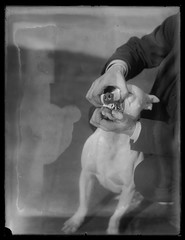
Your approach to dog training has a big impact on the actual training results that you will get. As long as you have the right mindset about dog training, you can be sure that your puppy will grow into a well-mannered dog that you can be proud of. Aside from having the right mindset, you would also do well to follow the most useful tips and tricks of dog training. Here are the top five dog training tips that will help you mould your dog into a positive addition to your family.
1. Show your dog that you are the pack leader.
Dogs are pack animals and naturally look to their pack leader for guidance. Therefore, you will have to establish your role as pack leader in order to gain control over your dog's behaviour. Pack leaders normally control the food supply, so a good way to establish leadership would be to always feed your dog only AFTER you have eaten. You should also set a feeding schedule and stick to it.
2. Use positive reinforcement.
Dogs respond best to positive reinforcement. One of the best ways to ensure success in dog training is to reward good behaviour and ignore unwanted behaviour. This will encourage your dog to repeat those behaviours that earn him praises and treats, and refrain from exhibiting behaviours that get him nothing in return. Be careful not to use punishment in training your dog, as this will only alienate him and make him regard you as an adversary. Rewards and positive reinforcement not only help ensure success in dog training, but also helps strengthen your bond with your dog.
3. Set realistic goals.
You can't ensure the success of your training unless you have a concrete goal to start with. Of course, you will have to keep your goals realistic; otherwise, you will just be setting yourself up for failure. For example, it is okay to expect your dog to master the "sit" command in two to three days, but you can't expect him to jump through hoops within the same timeframe.
4. Learn proper timing.
Proper timing can spell the difference between success and failure, where dog training is concerned. When you see your dog sniffing and circling around, immediately give a firm NO and then lead him to the designated elimination area. If you wait until he has done his business before scolding him, he won't understand that he is not supposed to make a mess inside the house. In the same way, you should praise your dog or give him a treat the very moment he exhibits a good behaviour. This will make him understand that he has just done something that pleases you.
5. Be patient and consistent.
Stay calm even when your dog makes mistakes. Yelling and showing impatience will get you nowhere. Give your dog enough time to learn each command, and always use the same words and hand signals when you give these commands. Consistency and patience are the keys to successful dog training.
1. Show your dog that you are the pack leader.
Dogs are pack animals and naturally look to their pack leader for guidance. Therefore, you will have to establish your role as pack leader in order to gain control over your dog's behaviour. Pack leaders normally control the food supply, so a good way to establish leadership would be to always feed your dog only AFTER you have eaten. You should also set a feeding schedule and stick to it.
2. Use positive reinforcement.
Dogs respond best to positive reinforcement. One of the best ways to ensure success in dog training is to reward good behaviour and ignore unwanted behaviour. This will encourage your dog to repeat those behaviours that earn him praises and treats, and refrain from exhibiting behaviours that get him nothing in return. Be careful not to use punishment in training your dog, as this will only alienate him and make him regard you as an adversary. Rewards and positive reinforcement not only help ensure success in dog training, but also helps strengthen your bond with your dog.
3. Set realistic goals.
You can't ensure the success of your training unless you have a concrete goal to start with. Of course, you will have to keep your goals realistic; otherwise, you will just be setting yourself up for failure. For example, it is okay to expect your dog to master the "sit" command in two to three days, but you can't expect him to jump through hoops within the same timeframe.
4. Learn proper timing.
Proper timing can spell the difference between success and failure, where dog training is concerned. When you see your dog sniffing and circling around, immediately give a firm NO and then lead him to the designated elimination area. If you wait until he has done his business before scolding him, he won't understand that he is not supposed to make a mess inside the house. In the same way, you should praise your dog or give him a treat the very moment he exhibits a good behaviour. This will make him understand that he has just done something that pleases you.
5. Be patient and consistent.
Stay calm even when your dog makes mistakes. Yelling and showing impatience will get you nowhere. Give your dog enough time to learn each command, and always use the same words and hand signals when you give these commands. Consistency and patience are the keys to successful dog training.



No comments:
Post a Comment